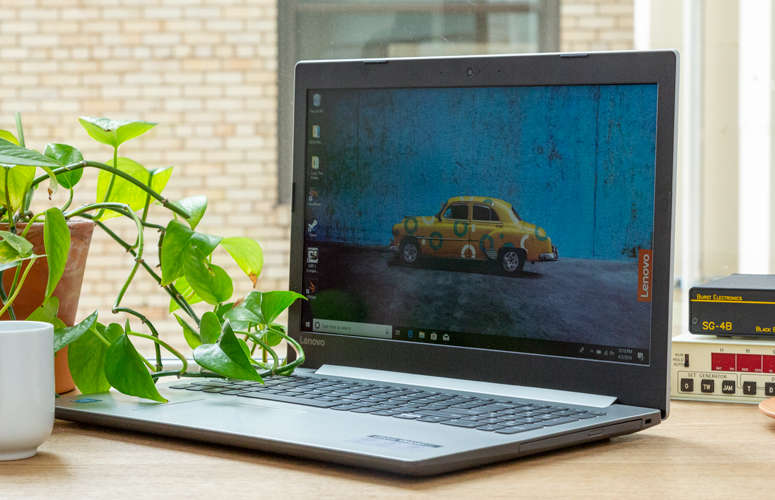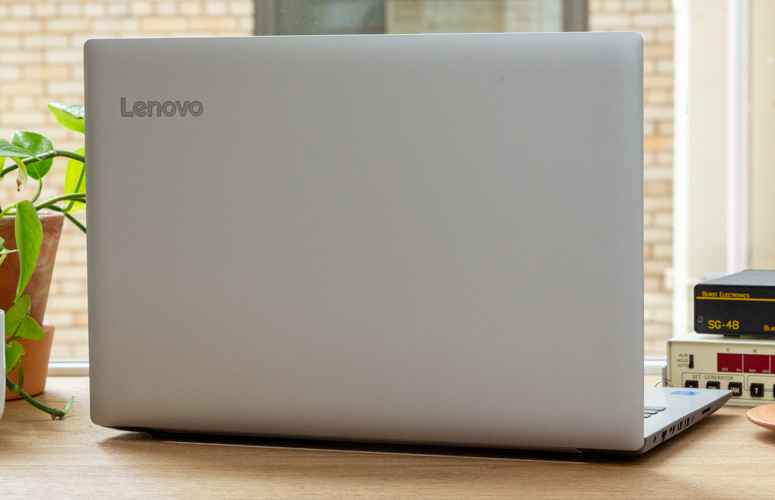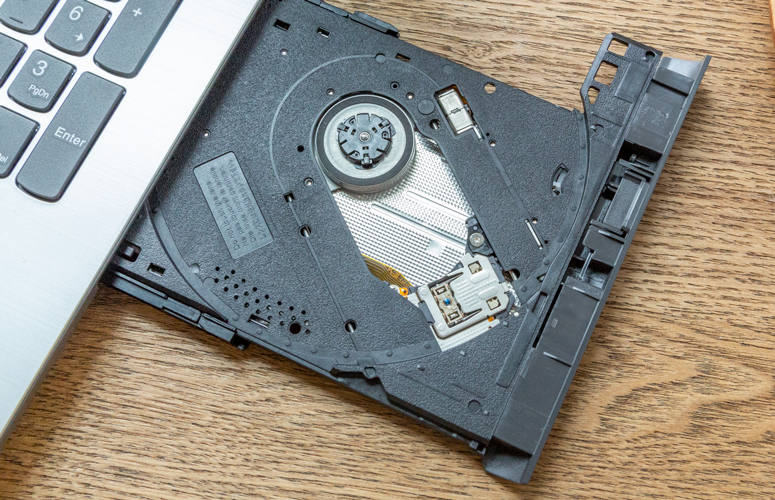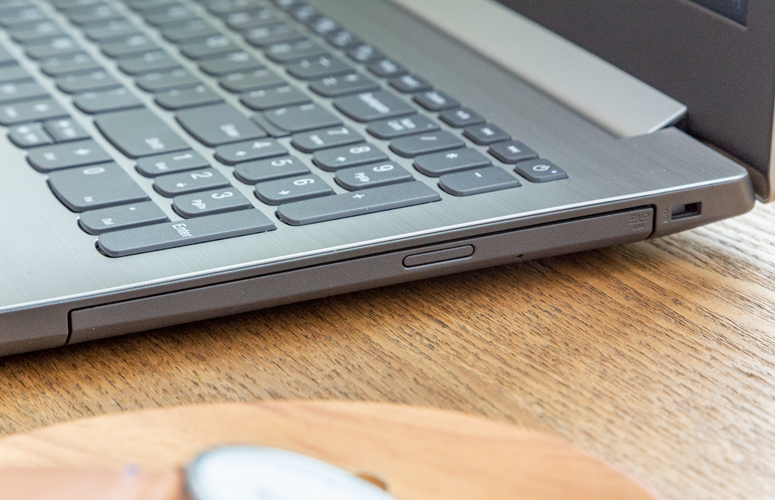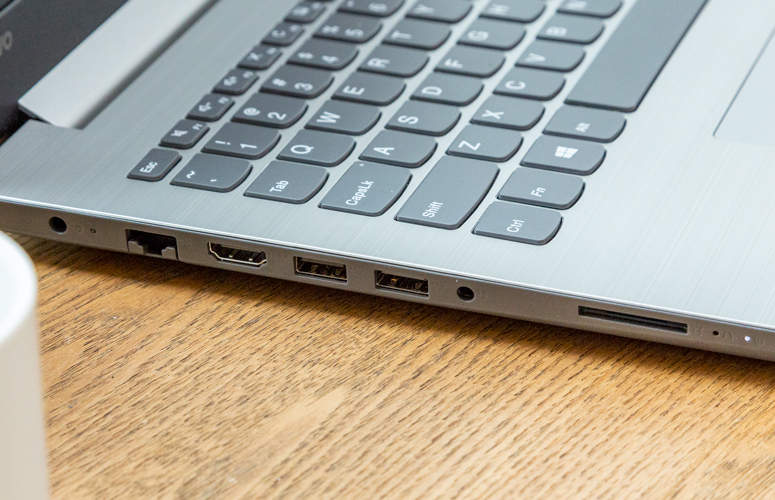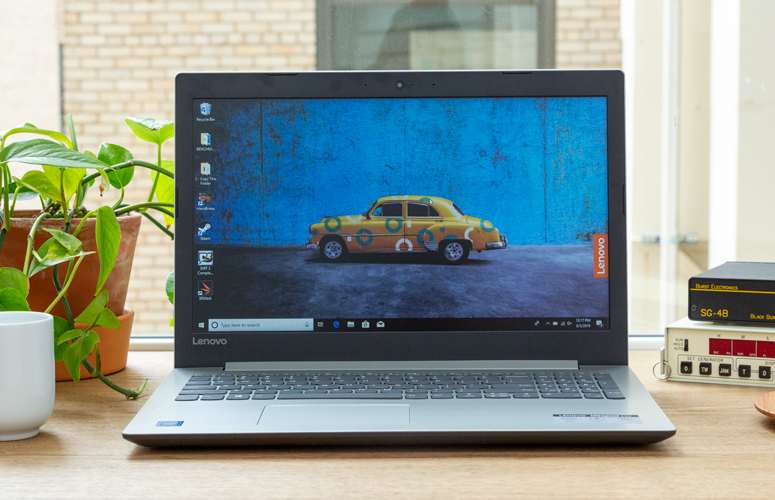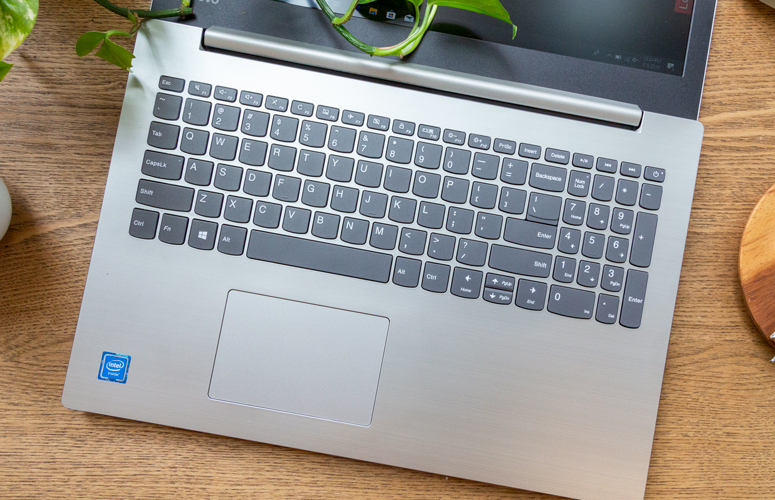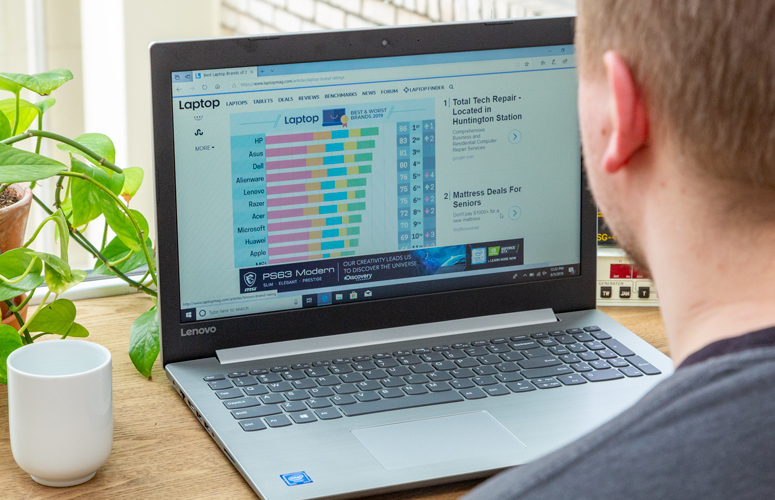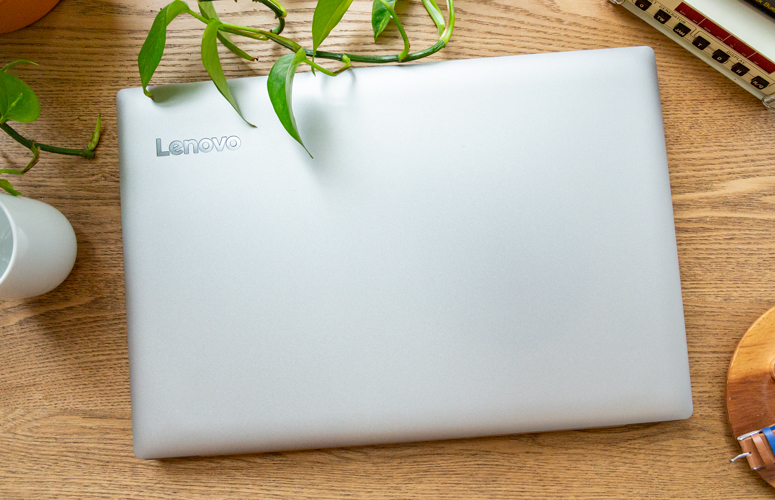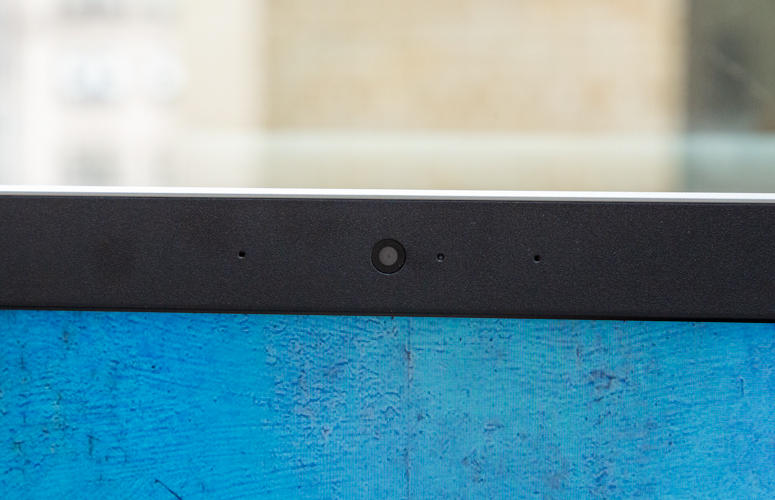Laptop Mag Verdict
The Lenovo IdeaPad 330 is an affordable 15-inch laptop with a good keyboard and sturdy chassis, but poor performance and short battery life hold it back.
Pros
- +
Sturdy construction
- +
Comfortable keyboard
- +
Very affordable
Cons
- -
Dim, dull display
- -
Subpar performance
- -
Short battery life
Why you can trust Laptop Mag
If you're on a tight budget and need a laptop for basic online tasks, then the Lenovo IdeaPad 330 (reviewed at $265) is a solid choice. This 15.6-inch machine has a sturdy chassis and a comfortable keyboard, perks that budget laptops rarely offer. The IdeaPad 330 even has a DVD drive, which isn't something we typically encounter on laptops anymore. Unfortunately, a poor display, short battery life, and below-average performance spoil the fun, so we recommend spending a bit more on a better system, like the Acer Aspire E 15. It's still one of the best laptops under $300 you'll find.
Lenovo IdeaPad 330 Price and Configuration Options
The IdeaPad 330 is sold in various configurations at a wide range of prices. We tested a $265 budget model with a 15.6-inch, 1366 x 768-pixel display, an Intel Celeron N4100 CPU, 4GB of RAM, and a 500GB, 5,400-rpm hard drive.
A more premium IdeaPad 330 with a Core i3-8130U CPU is available for $299, and there is also an AMD version with a Ryzen 5 2500U CPU, 12GB of RAM, and a 2TB HDD for $663.
Design
The IdeaPad 330 looks like an ordinary laptop. By that, I mean that if I asked you to draw a laptop, you'd probably land on something that looked a lot like the IdeaPad 330. It's a rectangle with rounded corners, and has a silver lid with a Chrome logo in one corner. The IdeaPad's chassis isn't thick, nor thin, and the laptop's silver lid and dark-gray undercarriage are made of hard plastic.
The inside of the laptop is just as uninspired. Thick bezels that frame a low-resolution display remind me of my dad's embarrassing GI glasses (or known in the military as "BCGs," or birth control glasses). On a positive note, the brushed-metal finish on the deck could easily be mistaken for aluminum, and the dark-gray keyboard keys contrast nicely against the surface.
Sign up to receive The Snapshot, a free special dispatch from Laptop Mag, in your inbox.
The IdeaPad 330 feels like a solid machine - not ThinkPad X1 Carbon premium - but above-average for the price.
In short, the IdeaPad 330's design serves its function as a laptop quite well, but without doing anything original. But that's OK. We're so used to seeing flimsy notebooks in this price range that one that feels as sturdy as the IdeaPad 330 is a breath of fresh air. Yes, the IdeaPad 330 feels like a solid machine - not ThinkPad X1 Carbon premium - but above-average for the price.
MORE: Best 2-in-1 Laptops - Laptop/Tablet Hybrids - Laptop Mag
The IdeaPad 330 isn't a 2-in-1 laptop and doesn't have a touch screen, but its flexible hinge rotates 180 degrees so that you can show the screen to people around you or adjust the angle of the display when using it on your lap while you relax on the couch.
At 14.9 x 10.2 x 0.9 inches and 4.4 pounds, the IdeaPad 330 is smaller and lighter than the Acer Aspire E 15 (15 x 10.2 x 1.2 inches, 5 pounds), and about the same size as the Dell Inspiron 15 3000 (14.9 x 10.2 x 0.8 inches, 5 pounds). Unsurprisingly, the 14-inch Acer Swift 1 (12.7 x 0 x 0.6 inches, 2.9 pounds) is a lot more portable than the IdeaPad.
Ports
The 330 has all the ports you could ask for - if it were 2012. But seriously, the right side of the laptop is taken up by a DVD drive. Yes, the CD drive lives on.
On the opposite side of the IdeaPad 330 is where you'll find all the ports, including a USB 3.1 port, a USB 2.0 input, an HDMI, an RJ45 Ethernet port and a headphone/mic combo jack.
There's also a 4-in-1 card reader so you can upload photos from an SD card without a dongle.
Display
It's hard to criticize such an inexpensive laptop for having a low-resolution display. At the same time, another $100 will get you a laptop with a 1080p panel, which will provide a much sharper image than the IdeaPad 330's 15.6-inch, 1366 x 768 display.
Despite the low pixel count, I could see individual drops of water beading on Sylvester Stallone's face after he splashed himself with water in the trailer for Rocky V. But a close look revealed lots of graininess, especially during darker scenes. I was more bothered by the display's dull colors and poor viewing angles, both of which made this over-the-top action sequel look washed out.
Our lab result reaffirmed some of those shortcomings. According to our colorimeter, the IdeaPad 330's display covers only 66% of the sRGB color gamut. While that tops the Aspire E 15 (62%) and matches the Swift 1, the IdeaPad 330's screen is less colorful than that of the average budget laptops (83%) and the Inspiron 15 3000 (73%).
Despite the low pixel count, I could see individual drops of water beading on Sylvester Stallone's face after he splashed himself with water in the trailer for Rocky V.
The IdeaPad 330's display is fairly dim, but its matte finish improves viewability in bright rooms. With a peak brightness of 188 nits, the display is dimmer than those on the Aspire E 15 (227 nits), Swift 1 (218 nits) and the average budget laptop (208 nits). The Inspiron 15 3000 measured an average of 170 nits.
Keyboard and Touchpad
Lenovo always seems to deliver with its keyboards, and the IdeaPad 330 doesn't break that trend.
While it's not ThinkPad good, I really enjoyed typing on the IdeaPad 330's keyboard. The subtly curved chicklet-style keys are nicely sized and fairly clicky. There's a pleasant weightiness to the keys, likely a result of their 70 grams of actuation force. The keys travel 1.4 millimeters, which is short of our 1.5-mm preference, but still better than the keyboards on competing devices. I do wish there was backlighting, but that's not yet a standard feature on budget laptops.
I typed at a rate of 114 words per minute with an accuracy of 95% on the 10fastfingers.com typing test. That result is a tad slower than my 119 wpm speed average, but matches my typical accuracy.
MORE: The 22 Best Keyboard Shortcuts for Your Windows Laptop
The 4.1 x 2.6-inch touchpad on the IdeaPad 330 is fairly responsive, and I didn't have any problems executing Windows 10 gestures, like pinch-to-zoom and three-finger swipe to switch windows.
Performance and Graphics
There was no need to run my typical workload on the IdeaPad 330 (Intel Celeron N4100, 4GB of RAM) to discover that its performance is only adequate for basic tasks, like sending emails or browsing the web.
It took nearly a minute to load Laptopmag.com with only four other Google Chrome tabs pulled up. If any other tabs were open, the IdeaPad 330 slowed to a halt. Fortunately, once a webpage finished rendering, I could flip through different pages with "only" a few seconds delays. And although I had to wait several moments for it to load, a 1080p YouTube video about Google's Stadia gaming service never buffered.
It took nearly a minute to load Laptopmag.com with only four other Google Chrome tabs pulled up. With any more tabs open, the IdeaPad 330 slowed to a halt.
The IdeaPad 330 landed in the middle of the pack for budget laptops on our performance benchmarks. With a score of 5,234 on the Geekbench 4.1 test, the Lenovo just edged out the budget category average (5,184), but couldn't keep up with the Swift 1 (Pentium Silver N5000, 5,527) or the Aspire E 15 (Core i3-8130U, 7,871).
MORE: Laptops with the Best Productivity Performance
The lackluster real-world performance I experienced on the IdeaPad 330 stemmed from its sluggish hard drive. The IdeaPad 330's 500GB, 5,400-rpm HDD needed 2 minutes and 57 seconds to duplicate 4.97GB of mixed-media files, at a rate of 28.8 megabytes per second. Only the Inspiron 15 3000 (500GB, 5,400-rpm HDD, 25.7MBps) was slower, while the Swift 1 (64GB eMMC, 65 MBps), Aspire E 15 (1TB, 5400-rpm SATA hard drive, 33.5MBps), and the average budget laptop (65MBps) have speedier storage.
The IdeaPad 330 really suffered on the HandBrake test, taking 1 hour and 7 seconds to transcode a 4K video into 1080p resolution. Other budget laptops completed the task in nearly half that time, including the Aspire E 15 (31:40) and Swift 1 (46:13), while the budget laptop average is even faster, at 21:27.
MORE: Hybrid Laptop Buying Guide: How to Buy a 2-in-1 Model
If you want to game on the IdeaPad 330, you're pretty much limited to games in the Windows App Store. The device played the racing game Dirt 3 at 14 frames per second, which is nowhere near our 30-fps playability threshold. For comparison, the Aspire E 15 (UHD Graphics 620) ran the game at 56 fps; the budget category average is 28 fps.
We saw similar results on the Ice Storm Unlimited graphics test, in which the 330 scored a 25,837, well below what the Aspire E 15 (63,817) and Swift 1 (UHD 605, 32,238) netted.
Battery Life
Stay near an outlet if you plan on using the IdeaPad 330 away from home.
With a runtime of 5 hours and 52 minutes on our Laptop Mag battery test (continuous web surfing over Wi-Fi at 150 nits), the IdeaPad 330 powered down several hours before the Aspire E 15 (8:48) and Swift 1 (10:14).
MORE: The Laptops with the Longest Battery Life: Guide
The IdeaPad 330 couldn't outlast the budget laptop category average (7:20), but if it's any consolation, it did better than the embarrassingly short-lived Inspiron 15 3000 (3:16).
Webcam
Do the person on the other end of your video chat a favor and don't use the IdeaPad 330's integrated webcam. The 640 x 480 lens is possibly the worst I've seen on a laptop, which is quite a feat considering that most webcams we test are just awful.
I was practically indistinguishable in the selfie I shot in our dimly-lit office. The image was so fuzzy that my hair was one solid blob and my eyes looked like hazy, dark pits. To make matters worse, the lights behind me washed out everything they touched, and my rich red shirt looked bleached out. Be sure to spring for a dedicated webcam if you plan on doing videoconferencing.
Heat
The IdeaPad 330 remained relatively cool, even when we taxed it by playing a 15-minute, full-screen video. The touchpad and keyboard warmed to only 81 degrees and 83 degrees, respectively. Only the underside of the laptop breached our 95-degree comfort threshold, hitting 96 degrees.
Bottom Line
The IdeaPad 330 is an ultra-affordable laptop with a large, 15.6-inch display, a good keyboard, and a solid, durable chassis. That might be enough for some folks, but the IdeaPad 330 has too many shortcomings - including short battery life, a dull display, and below-par performance - for it to earn our outright recommendation.
It'd be easy to overlook these issues if there weren't better options in the market. But some similarly priced laptops, like the Acer Aspire E 15 ($379), simply offer more for the money. It's also worth considering the Acer Swift 1, which has a smaller, 14-inch display but long battery life, an aluminum chassis and a much better webcam.
Still, if you have less than $300 to spend, the IdeaPad 330 is a decent option -- so long as you keep your expectations in check.
Credit: Laptop Mag
Lenovo IdeaPad 330 Specs
| Bluetooth | Bluetooth 4.2 |
| Brand | Lenovo |
| CPU | Intel Celeron N4100 |
| Card Slots | 4-1 card reader |
| Company Website | https://www.lenovo.com/us/en/ |
| Display Size | 15.6 |
| Graphics Card | UHD Graphics 600 |
| Hard Drive Size | 500GB |
| Hard Drive Speed | 5,400rpm |
| Hard Drive Type | HDD |
| Highest Available Resolution | 1366 x 768 |
| Native Resolution | 1366x768 |
| Operating System | Windows 10 Home |
| Optical Drive | DVD /-RW |
| Ports (excluding USB) | RJ-45, Lock Slot, Headphone/Mic, HDMI 2.0, USB 3.1, USB 2.0, SD card slot |
| RAM | 4GB |
| RAM Upgradable to | 8GB |
| Size | 14.9 x 10.2 x 0.9 inches |
| Touchpad Size | 4.1 x 2.6 inches |
| USB Ports | 2 |
| Warranty/Support | one-year warranty |
| Weight | 4.4 pounds |
| Wi-Fi | 802.11ac |
| Wi-Fi Model | Intel Dual Band Wireless-AC 3165 |
Phillip Tracy is the assistant managing editor at Laptop Mag where he reviews laptops, phones and other gadgets while covering the latest industry news. After graduating with a journalism degree from the University of Texas at Austin, Phillip became a tech reporter at the Daily Dot. There, he wrote reviews for a range of gadgets and covered everything from social media trends to cybersecurity. Prior to that, he wrote for RCR Wireless News covering 5G and IoT. When he's not tinkering with devices, you can find Phillip playing video games, reading, traveling or watching soccer.
